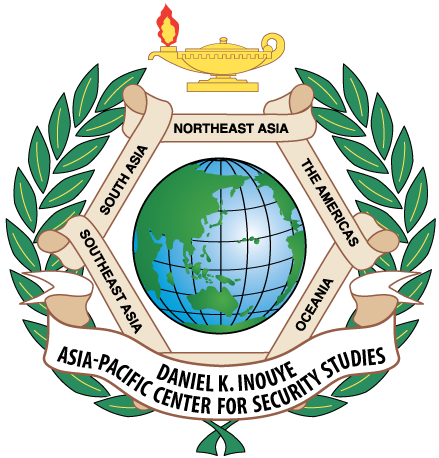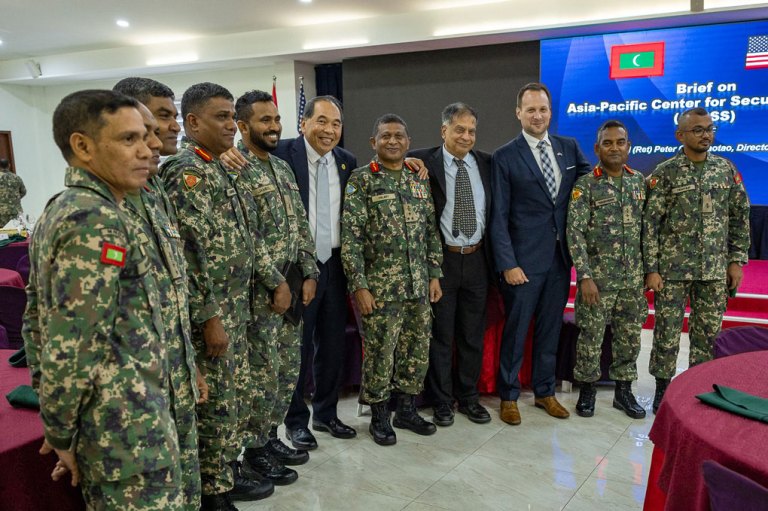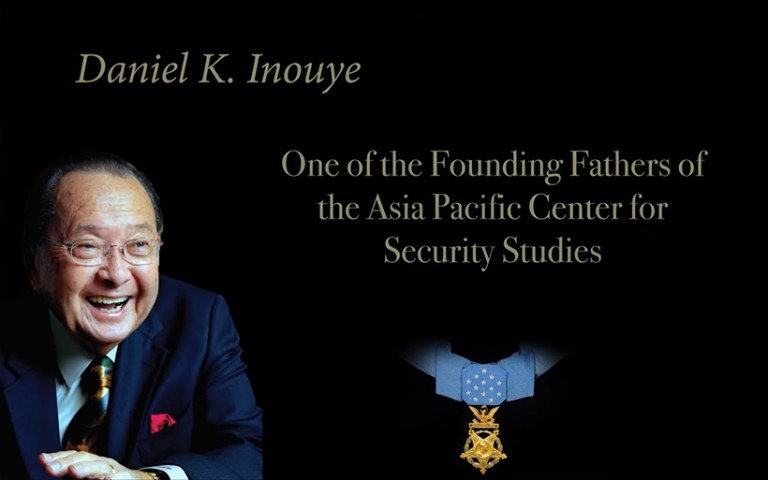Japan Journalists and Pacific Forum
Mr. Hidetoshi Arioka, Writer
Mr. Tomoki Sato, Staff Writer
Mr. Takuro Fujimoto, Political Reporter
Mr. Kiyotaka Nagashima, News reporter and Commentator
Mr. Ryota Shimabukuro, Chief Reporter
Ms. Kai Maeda, International Affairs Reporter
Mr. Beau Miller, PAO
Mr. Manuel Jeffrey Ordaniel Sistoso, Director Maritime Security
Mr. Akira Igata, Adjunct Fellow
Ms. Ayano Nishimura, Interpreter
- Time: 3:00 p.m.
- Location: CCR
- Host: Dean Cramer
Japan Journalists and Pacific ForumMr. Hidetoshi Arioka, Writer
Mr. Tomoki Sato, Staff Writer
Mr. Takuro Fujimoto, Political Reporter
Mr. Kiyotaka Nagashima, News reporter and Commentator
Mr. Ryota Shimabukuro, Chief Reporter
Ms. Kai Maeda, International Affairs Reporter
Mr. Beau Miller, PAO
Mr. Manuel Jeffrey Ordaniel Sistoso, Director Maritime Security
Mr. Akira Igata, Adjunct Fellow
Ms. Ayano Nishimura, InterpreterTime: 3:00 p.m.
Location: CCR
Host: Dean Cramer






Association
Countries Attending
Graduates
Alumni
Virtual Engagements
Virtual Participants
Years in Service
152
16,750*
15,840
133
7,759
30
positions
Vice President/Deputy PM
Minister/Deputy Minister
Ambassador/High Commissioner
Chief or Deputy Chief of Defense
Chief or Deputy Chief of Service
Cabinet or Parliament appointment
General/Flag Officer
11
122
276
56
114
210
1594










by Dr. Jimmie R. Lackey, who was then an Army colonel, and is a former DKI APCSS executive director. The Center was renamed on February 2015 to Honor the late Senator, Daniel K. Inouye.





Our Team








News
Join us for Dialogue | Episode 54 – Civil War: Myanmar, Five Years On with Dr. Miemie Winn Byrd
Five years after the coup, Myanmar’s civil war has become a persistent source of regional instability. Dr. Miemie Winn Byrd assesses how the battlefield and political dynamics have evolved, what outcomes are now plausible, and what the conflict means for Indo-Pacific security.
Forging the Future of Indo-Pacific Defense: The Inaugural Multinational Armaments Resilience Seminar (MARS)
DKI APCSS concludes its inaugural Multinational Armaments Resilience Seminar, strengthening Indo-Pacific defense industrial base resilience through multinational collaboration and partnerships.
Dialogue | Episode 53: Strategy in the Storm – Disaster Response as a Test of Indo-Pacific Partnerships
Joe Martin, Director of CFE-DM, explains why disaster response is a strategic stress test of Indo-Pacific partnerships. In this Dialogue Episode 53 discussion, Martin reveals how real resilience is built through practiced coordination, trusted relationships, and localized leadership, not improvised when the storm hits.
Join us for Episode 3 of Strategic Voices: Disruption, Division, Competition: What Shapes Security in the Indo-Pacific?
Strategic Voices examines the forces unsettling the Indo-Pacific security environment and asks whether today’s instability signals a passing storm or a lasting strategic realignment.
Security Nexus Perspective: When Distance Collapses – Iran’s Crisis and the Geography of India’s Constraints
Explore the critical intersections of geopolitics, energy security, and maritime risk in a new Security Nexus Perspective by DKI APCSS Professor Shyam Tekwani, titled "When Distance Collapses: Iran’s Crisis and the Geography of India’s Constraints." This analysis examines the evolving dynamics between India and Iran, emphasizing the strategic implications of sanctions, instability, and shifting trade routes in the Persian Gulf and Strait of Hormuz. With a focus on energy markets, the Indo-Pacific, and the strategic role of Chabahar Port, the paper offers essential insights into how regional instability affects global security frameworks.
 The stories posted here are only excerpts. Please go to our website to read the full articles.
The stories posted here are only excerpts. Please go to our website to read the full articles.
apcss.org/latest-news


 Maldives Regional Engagement
Maldives Regional Engagement Mongolian Regional Engagement and Alumni Association Event
Mongolian Regional Engagement and Alumni Association Event About DKI APCSS
About DKI APCSS Claret Chonggum
Claret Chonggum







